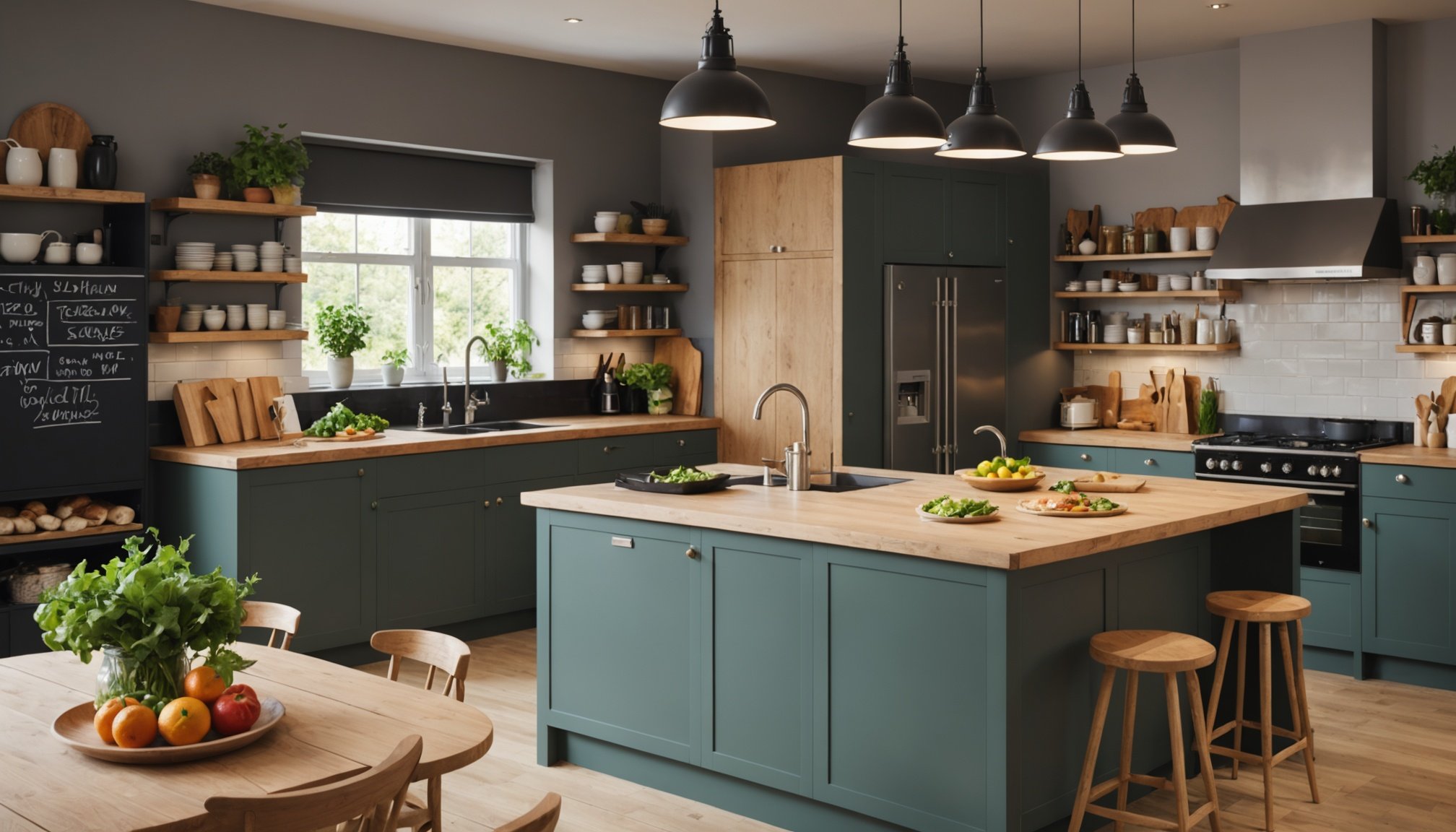Creating a sustainable kitchen is more than a trend; it’s a necessity for reducing food waste in the UK. By adopting innovative designs, you can transform your culinary space into an eco-friendly haven, maximizing efficiency and minimizing waste. From smart storage solutions to energy-efficient appliances, discover practical approaches to contribute to a healthier planet. This shift provides both environmental benefits and enhances your daily cooking experience. Embrace design strategies that not only look great but also help you to save resources. Your journey towards a sustainable kitchen starts here.
Practical Ideas for a Sustainable Kitchen
Creating an eco-friendly kitchen environment can be both rewarding and impactful.
Also read : Crafting the Perfect UK Kitchen: Tips for Effortless Hosting and Vibrant Entertaining
Utilizing Seasonal and Local Ingredients
Sustainable kitchen ideas often start with choosing seasonal and local ingredients. This approach not only supports local farmers but also significantly reduces the carbon footprint associated with transporting food over long distances. For instance, opting for locally grown vegetables in season ensures fresher produce and less energy consumption.
Implementing Meal Planning
Effective meal planning plays a crucial role in minimizing food waste. By planning meals ahead, you can buy only what you need, thus reducing unnecessary purchases and waste. Consider creating a weekly menu and shopping list to streamline this process. This practice not only contributes to an eco-friendly kitchen but also saves money.
Also read : Crafting the Perfect UK Kitchen: Tips for Effortless Hosting and Vibrant Entertaining
Incorporating Composting Solutions
Incorporating composting solutions into your kitchen design is another excellent way to promote sustainability. Composting helps recycle organic waste, turning it into nutrient-rich soil. Consider setting up a small compost bin under your sink or in a convenient corner to make composting a seamless part of your kitchen routine.
- Benefits of Composting:
- Reduces landfill waste
- Enriches soil
- Decreases need for chemical fertilizers
Adopting these eco-friendly practices can transform your kitchen into a hub of sustainability, encouraging a more conscious lifestyle.
Innovative Kitchen Designs
Exploring the latest kitchen design trends can significantly enhance the functionality and sustainability of your space.
Open-Plan Layouts
Open-plan kitchens are gaining popularity for their ability to create a seamless flow between cooking and living areas. This design encourages food preparation efficiency and facilitates waste reduction by integrating dining and cooking spaces. By removing barriers, open layouts foster communication and collaboration, making the kitchen a social hub.
Multi-Functional Spaces
Incorporating multi-functional spaces into your kitchen design maximizes efficiency and utility. Consider installing an island that serves as a prep station, dining area, and storage unit. This approach not only saves space but also supports sustainable living by reducing the need for additional furniture and appliances.
- Benefits of Multi-Functional Spaces:
- Optimizes space usage
- Enhances kitchen efficiency
- Encourages sustainable design
Smart Storage Solutions
Creative smart storage solutions are essential in preventing food spoilage and maintaining an organized kitchen. Utilize pull-out shelves, drawer dividers, and labeled containers to keep items easily accessible and visible. These solutions help minimize food waste and support a sustainable design by ensuring items are used before expiration.
Implementing these kitchen design trends can transform your kitchen into a model of efficiency and sustainability, aligning with modern eco-conscious living.
Eco-Friendly Materials for Kitchen Renovation
Discover sustainable solutions for a greener kitchen space.
Sustainable Materials for Countertops and Cabinets
Choosing sustainable materials for your kitchen renovation can significantly reduce your environmental impact. Consider using materials such as bamboo or reclaimed wood for countertops and cabinets. These eco-friendly options not only provide durability but also add a unique aesthetic to your kitchen. Bamboo, for instance, grows rapidly and regenerates quickly, making it a highly renewable resource.
Benefits of Reclaimed or Recycled Materials
Incorporating reclaimed or recycled materials into your kitchen design is another excellent way to promote sustainability. These materials reduce the need for new resources and minimize waste. Using reclaimed wood for cabinets or recycled glass for countertops can create a distinctive look while supporting eco-friendly practices.
- Advantages of Reclaimed/Recycled Materials:
- Reduces demand for new resources
- Minimizes environmental waste
- Offers unique design aesthetics
Importance of Low-VOC Paints and Finishes
Selecting low-VOC paints and finishes is crucial for both health and environmental reasons. Volatile Organic Compounds (VOCs) can release harmful chemicals into the air, affecting indoor air quality. By opting for low-VOC products, you contribute to a healthier home environment and reduce your kitchen's ecological footprint. These paints and finishes are available in various colors and finishes, ensuring style without compromise.
Tools and Technology to Minimize Food Waste
Integrating kitchen technology for food waste reduction is essential in modern eco-conscious living.
Smart Appliances
Smart appliances are revolutionizing how we manage our kitchens. Devices that track food inventory and expiration dates help ensure that food is used before it spoils. For instance, smart refrigerators can send reminders to your smartphone about upcoming expiry dates, encouraging timely use.
Efficient Meal Prep Tools
Investing in tools designed for efficient meal prep and storage can significantly reduce waste. Vacuum sealers and portion control containers help preserve food freshness and prevent spoilage. These tools make it easier to store leftovers and bulk purchases, ensuring you make the most of your groceries.
Apps and Resources
Numerous apps and online resources are available to assist in managing food waste. These platforms offer meal planning tips, recipes for leftovers, and reminders for using perishable items. By leveraging these digital tools, you can create a more organized and sustainable kitchen environment.
- Benefits of Kitchen Technology:
- Reduces food spoilage
- Enhances meal planning
- Supports sustainable living
Implementing these food waste reduction tools in your kitchen fosters a more sustainable lifestyle, aligning with global efforts to reduce waste and conserve resources.
Case Studies of Sustainable UK Kitchens
Exploring successful sustainable designs in UK kitchens.
Examples of Successful Implementations
In the UK, numerous kitchens have successfully adopted sustainable practices, showcasing innovative design and eco-friendly solutions. One notable example is a London-based kitchen that integrates reclaimed wood cabinetry and low-VOC finishes, significantly reducing its environmental impact. The homeowners reported a 30% decrease in food waste due to efficient storage solutions and meal planning strategies.
Insights from Homeowners and Designers
Interviews with homeowners and designers reveal the transformative impact of sustainable designs. A designer from Manchester highlighted the importance of multi-functional spaces in reducing clutter and promoting efficiency. Homeowners in Bristol shared their experiences with composting solutions, noting a marked improvement in waste management and soil enrichment.
Impact Analysis
Analyzing the impact of these design choices on food waste reduction shows promising results. Kitchens utilizing smart storage solutions and sustainable materials have seen a substantial decline in waste. This not only benefits the environment but also encourages a conscious lifestyle among residents.
- Key Benefits of Sustainable UK Kitchens:
- Reduced food waste
- Enhanced kitchen efficiency
- Healthier living environments
These case studies demonstrate the potential for UK kitchens to lead the way in sustainable design, offering practical insights and inspiration for others.
Expert Recommendations for Sustainable Kitchen Practices
Insights from experts can transform your kitchen into a model of sustainability.
Food Storage and Preservation
Chefs and nutritionists emphasize the importance of proper food storage to extend shelf life and reduce waste. They recommend using airtight containers and vacuum sealing to preserve freshness. Incorporating these practices ensures that ingredients remain usable for longer, minimizing spoilage and waste.
Sustainability experts suggest organizing your pantry with a first-in, first-out system. This method helps use older items before they expire, supporting a more sustainable approach to kitchen management.
Energy-Efficient Kitchen Practices
Adopting energy-efficient practices is crucial for a sustainable kitchen. Experts advise using LED lighting and energy-star-rated appliances to reduce electricity consumption. Regular maintenance of kitchen equipment, such as cleaning refrigerator coils, can also improve efficiency.
Recommended Products and Brands
Choosing products from brands that prioritize sustainability can enhance your kitchen’s eco-friendliness. Look for companies that offer biodegradable or recyclable packaging. Below is a list of recommended sustainable brands:
- Brand A: Known for eco-friendly packaging
- Brand B: Offers energy-efficient appliances
- Brand C: Specializes in biodegradable kitchen products
Incorporating these expert tips and recommendations can lead to a more sustainable kitchen, promoting both environmental responsibility and efficiency.
Visual Inspiration for a Sustainable Kitchen
Explore innovative ideas to transform your kitchen into an eco-friendly haven.
Gallery of Innovative Kitchen Designs
Discover a collection of inspiring kitchen design ideas that prioritize sustainability and minimize waste. These designs integrate eco-friendly interiors to create spaces that are both functional and environmentally responsible. Consider open shelving made from reclaimed wood, which not only adds character but also encourages mindful organization, reducing clutter and waste.
Eco-Friendly Materials and Layouts
Incorporate eco-friendly materials like bamboo countertops and recycled glass tiles to enhance your kitchen's sustainability. These materials are not only durable but also visually appealing, offering a modern twist on traditional designs. An open-plan layout can further enhance kitchen design inspiration, promoting efficient use of space and natural light.
- Benefits of Eco-Friendly Materials:
- Sustainable sourcing
- Unique aesthetics
- Long-lasting durability
Incorporating Plants and Greenery
Adding plants to your kitchen can improve air quality and create a vibrant, eco-friendly interior. Consider installing a vertical herb garden or hanging planters to maximize greenery without sacrificing space. These additions not only enhance the visual appeal but also provide fresh ingredients for cooking, aligning with sustainable living principles.













